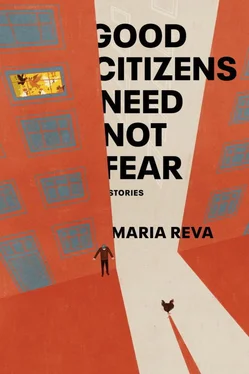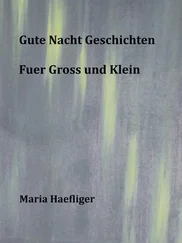Maria Reva - Good Citizens Need Not Fear - Stories
Здесь есть возможность читать онлайн «Maria Reva - Good Citizens Need Not Fear - Stories» весь текст электронной книги совершенно бесплатно (целиком полную версию без сокращений). В некоторых случаях можно слушать аудио, скачать через торрент в формате fb2 и присутствует краткое содержание. Город: New York, Год выпуска: 2020, ISBN: 2020, Издательство: Doubleday, Жанр: Современная проза, humor_satire, на английском языке. Описание произведения, (предисловие) а так же отзывы посетителей доступны на портале библиотеки ЛибКат.
- Название:Good Citizens Need Not Fear: Stories
- Автор:
- Издательство:Doubleday
- Жанр:
- Год:2020
- Город:New York
- ISBN:978-0-38554-529-7
- Рейтинг книги:3 / 5. Голосов: 1
-
Избранное:Добавить в избранное
- Отзывы:
-
Ваша оценка:
- 60
- 1
- 2
- 3
- 4
- 5
Good Citizens Need Not Fear: Stories: краткое содержание, описание и аннотация
Предлагаем к чтению аннотацию, описание, краткое содержание или предисловие (зависит от того, что написал сам автор книги «Good Citizens Need Not Fear: Stories»). Если вы не нашли необходимую информацию о книге — напишите в комментариях, мы постараемся отыскать её.
Good Citizens Need Not Fear: Stories — читать онлайн бесплатно полную книгу (весь текст) целиком
Ниже представлен текст книги, разбитый по страницам. Система сохранения места последней прочитанной страницы, позволяет с удобством читать онлайн бесплатно книгу «Good Citizens Need Not Fear: Stories», без необходимости каждый раз заново искать на чём Вы остановились. Поставьте закладку, и сможете в любой момент перейти на страницу, на которой закончили чтение.
Интервал:
Закладка:
Zaya looked blank.
“Sixteen,” Konstantyn intervened. This was Orynko’s age.
“Engaged or married?”
Zaya shook her head.
“Children?”
“What about them?”
“Do you have any, or are you expecting.”
“She’s sixteen,” Konstantyn repeated.
“If she bleeds between the legs it’s possible.”
“I don’t bleed between the legs,” said Zaya.
Both Konstantyn and the administrator turned to her in surprise. The subject had never come up, but Konstantyn had assumed it was because Zaya was tending to it on her own, stoically, the way women did.
The administrator ticked something on her page. Seeing the look on Konstantyn’s face, she said, “I don’t make the questions.” At last she asked Zaya, “Name and provenance?”
“My name is Orynko Bondar, from Kirovka, Ukraine,” the girl announced, in a stage voice Konstantyn wished she’d save for the stage. He tensed, the gravity of the moment settling on his shoulders like a lead coat. The original Orynko Bondar had been carted away hundreds of kilometers to prevent her from being here today, from uttering those simple words. Konstantyn was ready to pull out a small envelope of cash in case the administrator recognized Miss Kirovka’s name and refused to add it, but it appeared that no such directive had trickled down to her. “How about a stage name? Something a tad more”—the woman paused, choosing her words—“urban.”
Something a tad more Russian, he knew she’d meant. “We’re keeping the name.”
The administrator shrugged, recorded the name, and opened the dressing room door for the new contestant. Fumes of aerosols, eaux de toilette, and singed hair burst forth, as did the sounds of spraying, peeling, and other torturous acts. The administrator rushed down the corridor to tend to the girl with the hair rollers, who had begun retching again.
Zaya and Konstantyn stood at the doorway. He could accompany her no further. He was supposed to hand off the suitcase with the marriage-registration dress, bathing costume, makeup, crown, and sash, but found himself unable to do so. The dressing room threw a cold, cutting light on Zaya’s skin. He had an urge to yank her away from it, reverse his horrid plan. He could no longer convince himself that, once the face of Miss Kirovka’s double was broadcast around the Union, she would be safe. After all, he had not been able to predict Orynko’s exile.
“You don’t have to do this,” he blurted. “We can turn around, go home.”
With that last word, “home,” the future rearranged itself in a splendid vision. His home would be hers, too. He’d sleep on a cot in the corridor, give her the entire room. Never would the girl suffer again. He’d enroll her in school, a good school, where she would be surrounded by knowledgeable people—much more knowledgeable than Konstantyn—who would teach her about the dynamics of flight, planetary orbits, anything she had ever wondered about.
“Kostya,” she said softly, “I’m living out a girl’s dream.” Her face was closed to him, as though she were already gone. She took the suitcase, stepped into the dressing room.
The Palace of Culture lectorium dwarfed the one in Kirovka. Its four curved balconies hummed with spectators waiting for the show to begin. A red runner carpet—the catwalk—bisected the stage. To the right a television crew hustled around a nest of cables. To the left stood the judges’ table, the six brass nameplates designating the seats waiting to be filled: MINISTER OF CULTURE, CHAIRMAN OF COUNCIL OF MINISTERS, STATE COMMITTEE CHAIRMAN, PROCURATOR GENERAL, PAINTER, COMPOSER. Snatches of melody rose from the narrow orchestra pit, where the musicians were warming up.
Konstantyn sat in the second row, main level. He was so close to the stage, he could smell its newly varnished floor. He tried to let himself sink into the cheerful chatter around him. He envied the other spectators their simple motive for being here—to enjoy themselves, watch a good show.
The lights dimmed. An oboist blew a piercing note, joined by the woodwinds, brass, strings, timpani. Konstantyn had heard an orchestra tune only a handful of times in his life and, despite his nervousness, the sound of the instruments joining in a single voice made him shiver with pleasure.
A small bearded man in a burgundy suit—an actor whose name Konstantyn couldn’t remember—stepped onto the stage and the hall burst into applause. He welcomed everyone to the Miss USSR beauty competition, the first of its kind in the Union (“Second,” Konstantyn muttered), and reminded the audience of the prizes to be claimed: a victory tour around the Union, a large-screen television, and a white dress. The orchestra played the city’s anthem as the judges filed in and found their seats, solemn faces fit for a court proceeding. Irina Glebovna was the last to enter the stage. She wore a brown pantsuit with thick, armor-like shoulder pads, and her skin possessed the yellowish sheen of the embalmed. Before taking a seat, she installed herself in front of the announcer’s microphone and gave a spirited speech about the importance of a Union glued together not only by a common economy and language, but also by a common culture—three components guaranteeing peace, to be enjoyed by many generations to come.
The pageant opened with the gown round. The thirty-five contestants waited at the far end of the stage, a row of silhouettes in the dim lighting. When called, each stepped into the spotlight, and strutted down the runway holding a white paper fan labeled with a number. Unlike the hodgepodge of contestants in Konstantyn’s pageant, the young women here had a uniform look: pastel gowns, teased hairstyles, aggressive teeth-and-gums smiles.
Contestant Number 14, from Turkmenistan, bobbed a curtsy at the end of the runway.
Contestant Number 18, from Georgia, blew a kiss.
Finally the announcer called, “Orynko Bondar from Kirovka, Ukraine!”
The Minister of Culture straightened in her seat. She raised an index finger to the camera crew in warning: Be ready to cut.
Zaya marched in front of the Party members, the spotlight trailing her like a blazing eye. She wore makeup so thick it looked creamy, like something that needed refrigeration—an administrator’s doing, he assumed. Zaya’s puffy sleeves—decades out of style, Konstantyn saw now—bulged with the crown and sash. Did he still want her to put them on? He tried to catch her eye, but on she trooped, one high-heeled foot in front of the other. She appeared unshaken by the size of the audience, gazing straight ahead as if walking a tightrope. In one moment Konstantyn felt himself rising in his seat, ready to snatch her from the stage’s deep maw; the next, he egged the girl on: show them, Miss Kirovka, show them that neither you, nor your townspeople, nor your country, will be silenced.
At last she reached the end of the runway. And—nothing happened. Instead of revealing the crown and sash, she simply turned on her heel and strode back upstage, as if this had been the plan all along.
Konstantyn felt dizzy with relief. He was grateful for her disobedience. Had the spectators recognized the name? Had they caught the significance of Miss Kirovka’s presence?
Zaya rejoined the line of silhouettes. As the other contestants continued to file down the runway, domestic worries filled Konstantyn’s mind, thrilling in their newness. He thought of the shoes and coat Zaya would need for the upcoming winter, the schoolbooks he would have to procure.
His attention was wrenched back to the stage at the word “Norgorsk.” The twenty-first contestant stepped under the spotlight. Orchestral music swelled as she glided down the runway in an opal mermaid gown and a white fur shawl that glowed under the lights. Her silvery hair had been teased and crimped into a leonine mane. Konstantyn thought he had never seen someone so breathtaking, but as she approached, he realized he had.
Читать дальшеИнтервал:
Закладка:
Похожие книги на «Good Citizens Need Not Fear: Stories»
Представляем Вашему вниманию похожие книги на «Good Citizens Need Not Fear: Stories» списком для выбора. Мы отобрали схожую по названию и смыслу литературу в надежде предоставить читателям больше вариантов отыскать новые, интересные, ещё непрочитанные произведения.
Обсуждение, отзывы о книге «Good Citizens Need Not Fear: Stories» и просто собственные мнения читателей. Оставьте ваши комментарии, напишите, что Вы думаете о произведении, его смысле или главных героях. Укажите что конкретно понравилось, а что нет, и почему Вы так считаете.












